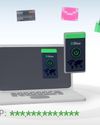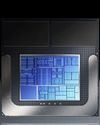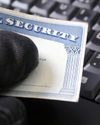Simple steps can protect your privacy and location data.

Before you join the Wi-Fi hotspot at your local cafe, you might want to make sure it won’t follow your footsteps—literally—after you leave.
Ostensibly “free” Wi-Fi hotspots are in hundreds of thousands of businesses and public spaces across the United States. They’re in shopping malls. In airports. In chain restaurants. In local cafes. As a result, it’s easier than ever to get online. If your notebook or phone lacks a reliable data connection, you can still connect to a hotspot. But this convenience often comes at a price: your personal data and privacy.
When you use “free” Wi-Fi, there’s a good chance it’s managed by a third-party provider—which gets you online in exchange for your valuable sign-on data. The sign-on information that hotspots require will vary, but often includes your email address, phone number, social media profile, and other personal information. All can be used to target you with advertising and gain insights on your habits.
As Emory Roane, policy counsel at Privacy Rights Clearinghouse (go.pcworld. com/part), told PCWorld: “Read through the Wi-Fi Terms of Use for any of these businesses and you’ll almost certainly realize that there’s still no such thing as a free lunch.”
That’s probably not a surprise to most Wi-Fi hotspot users. But what might surprise you is that some hotspot providers are taking data collection a step further, and quietly tracking millions of users’ whereabouts even after they’ve left an establishment. These hotspots are part of America’s burgeoning location-based Wi-Fi marketing industry.
PCWorld spoke to privacy experts and Wi-Fi location-analytics companies to learn more about how this technology works, and what you can do to avoid being tracked.
WI-FI LOCATION TRACKING AND YOU
هذه القصة مأخوذة من طبعة December 2018 من PCWorld.
ابدأ النسخة التجريبية المجانية من Magzter GOLD لمدة 7 أيام للوصول إلى آلاف القصص المتميزة المنسقة وأكثر من 9,000 مجلة وصحيفة.
بالفعل مشترك ? تسجيل الدخول
هذه القصة مأخوذة من طبعة December 2018 من PCWorld.
ابدأ النسخة التجريبية المجانية من Magzter GOLD لمدة 7 أيام للوصول إلى آلاف القصص المتميزة المنسقة وأكثر من 9,000 مجلة وصحيفة.
بالفعل مشترك? تسجيل الدخول

Private Internet Access: A low-price, high-value VPN for everyone
This veteran VPN shows it can still hang with the best.

Hands-on: Kensington's first Thunderbolt 5 dock is built for the future
Thunderbolt 5 is here...but you'll need more than just this well-built Kensington dock to take advantage of it.

Tested: Intel's Lunar Lake chip wants you to forget Qualcomm laptops exist
Great battery life, mediocre performance, surprisingly decent gaming: That is how Intel's Lunar Lake chip stacks up.

7 laptop habits that coax the most out of your battery
Don't send your laptop into an early grave.

WordPad is gone from Windows 11. Here's how to bring it back
With the arrival of Windows 11 version 24H2, WordPad is officially gone. Want to keep using it? You're in luck.

Hackers know your social security number. Here's how to stay safe
Thanks to a multitude of data leaks, your most sensitive information is now easily accessible to the world.

20 insanely useful Windows 11 keyboard shortcuts I use every day
After so many years, I'm still discovering new keyboard shortcuts.

WHAT THE HECK IS AN NPU, ANYWAY? HERE'S AN EXPLAINER ON AI CHIPS
ALL PCS WILL SOON HAVE NEURAL PROCESSING UNITS. HERE'S WHAT THAT MEANS FOR YOU IN SIMPLE TERMS.

WINDOWS 11'S 2024 UPDAATE: 5 BIG CHANGES I REALLY LIKE (AND MORE)
WINDOWS 11'S ANNUAL UPDATE IS ROLLING OUT OVER THE NEXT FEW WEEKS.

Hackers are using AI-generated code for malware attacks
Two separate attacks have been spotted using code that was probably written by artificial intelligence.